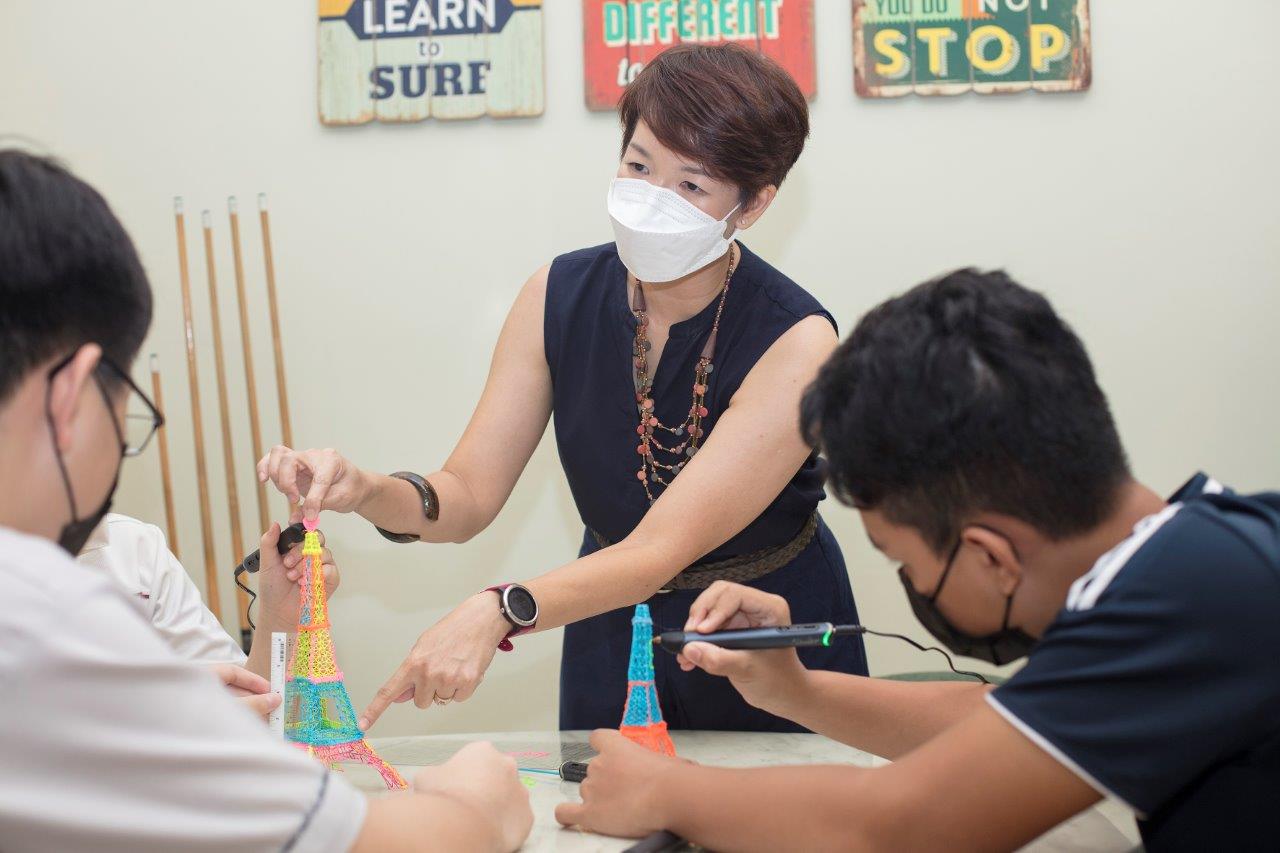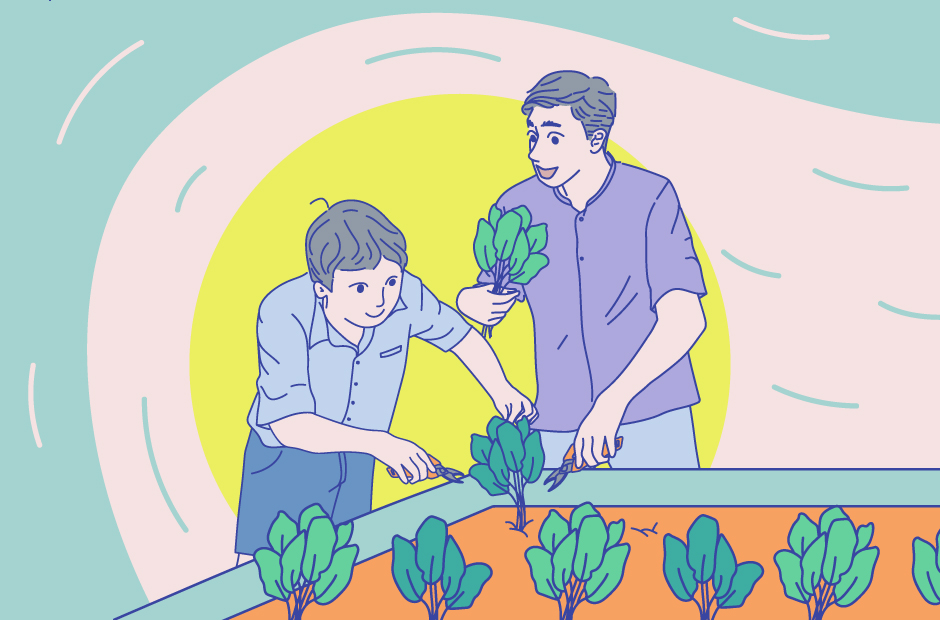Edwina Cheng Wei Na, Compassvale Secondary, President’s Award for Teachers 2021 Recipient
Long-term absenteeism, low motivation, lack of family support.
These are some of the problems that Edwina Cheng tackles head on as one of the teachers overseeing her school’s Gear-Up programme, which provides after-school support and care for students, some of whom come from disadvantaged backgrounds.
Attendance at the programme was low initially, hovering around the single digits, due mainly to the stigma associated with it.
“Some of them think that Gear-Up is for ‘naughty’ students and do not want to be labelled as such,” said Edwina, an Elementary and Additional Mathematics teacher who has been teaching at Compassvale Secondary School for 15 years. “Others do not find the planned activities appealing and would rather go home.” There are also those who have to support their family by working part-time after school. For these students, the school aims to occupy them after school with healthy activities after helping them make adjustments to their work schedule or obtaining financial aid for the family.
So what did she do when she helmed the programme in 2019? She rolled up her sleeves, as she usually does, by “doing things with” her students rather than “to them”. Since refreshing its strategy and activities, attendance has jumped over two-fold.
Edwina is an advocate of the Social Discipline Window, a concept aimed at helping those in positions of authority – such as teachers – to build a more positive and restorative community.
Through this direct, pragmatic and solution-focused approach, she finds ways for her students to answer their own questions.
She explained, “The framework combines high expectations of behaviour and high support, and is characterised by doing things with people, rather than to them or for them.
“For example, if there is a futsal class for Gear-Up, I’ll make sure I’m there alongside the students – doing warm-up exercises with them, cheering them on while they are training, and taking photos of them in action. I won’t be on my laptop doing my work or sending out emails.”
Breaking barriers
As one of two teachers overseeing the Gear-Up programme, Edwina and her colleague work closely with community partners to organise activities for her students.
One key change the pair mooted was to take over the planning from external vendors. Instead, they had a candid discussion with the students to find out what they hoped to gain from the programme. The takeaway was clear: Sporting activities and workshops that offered hands-on learning ranked high on the students’ wish list.
Since then, various interest-based activities have been organised. From futsal and yoga to K-pop dance classes and bubble tea-making workshops, every planned activity was the result of a teacher-student discussion, and people started turning up.
Today, some 20 to 30 students show up regularly for the programme’s twice-weekly sessions.
“If the students associate the programme with ‘punishment’, they naturally wouldn’t want to come. So we share that we want to help them develop their skills, and identify and highlight their strengths through fun and interesting activities.”
Besides imparting knowledge and developing capabilities, Edwina also ensured that the activities strengthen the students’ social-emotional competencies and social skills. For example, a video recording of them performing a K-pop dance routine and playing the cajon was shared with a senior activity centre to bring Christmas cheer amid the pandemic. After making bubble tea or pastries, the students would learn the posture of service by presenting them to school staffers.
Edwina also provides regular Gear-Up updates to the students’ form teacher or subject teachers, and invites them to participate in the activities.
Ritchell Choong, an Assistant Year Head and regular Gear-Up volunteer, shared, “Through the programme, the students have grown to become more confident and positive in their demeanour and attitude. Many of them have built strong social bonds with the Gear-Up students and teachers, and also opened up more to their form teachers and classmates.”
From problem-solvers to mentors and changemakers
Amid the bustle of the programme’s increased engagements, Edwina has not lost sight of the intent behind these activities — to connect with the students and help them do well in school.
Her efforts are paying off. When Secondary 2 student Amy* was first invited to join Gear-Up, she refused to attend, but relented when Edwina and her colleague took the time to reach out to her. Each time she turned up, they would make it a point to chat with her during the activity breaks. Over time, she warmed up to them and the other students.
A year on, Amy, now a regular face at the sessions, gladly took on the role of emcee at a Gear-Up parent engagement session and even wrote the script on her own. Said Edwina, “She has also started to share more about what’s happening at home, and what struggles that she’s facing. We take heart that she’s slowly opening up to us.”
Edwina also came up with an idea of a peer support system, where students like Amy who saw benefits from the programme could serve as mentors to newcomers.
“I thought, why don’t we open up more avenues for them, and get them to be a leader within Gear-Up itself? We decided to call them ‘Changemakers’, because we know that they will make positive changes in their lives and in the lives of others.”
There are six Changemakers in a certain Secondary 4 class whose personal growth is so evident that their form teachers have remarked on the change: Stemming from their strong sense of belonging to the Gear-Up community, the students appear more accountable for their behaviour, and when they were made mentors to the newer members, they exuded a healthy glow of pride.
Bringing innovative practices to the classroom too
Edwina’s passion for hands-on learning extends to the classroom.
For example, when teaching her students the Pythagoras’ Theorem, getting them to learn how to apply the formula and solve problems was just one aspect of it. To make the lesson more interesting, she would ask her students to create a Wheel of Theodorus drawing inspired by the theory.
Similarly, during a lesson on the surface area of a sphere, she once asked her students to find out the surface area of an orange in class by peeling it and laying it out to see its relation to the formula.
“The kids enjoyed the peeling, the juice got into their eyes and trickled down their arms, and they eventually ate the fruit. I enjoy conducting such hands-on activities and get my students to move around and interact with others,” she enthused.
Interestingly, Edwina struggled with Maths when she was a student. However, through sheer determination and hard work, and with good teachers along the way, she gained confidence in the subject in junior college, and even professed a love for it. This is a personal anecdote that Edwina often shares with her students to inspire them to press on in the face of learning difficulties.
“It’s important to see our students as individuals, someone who needs to feel appreciated respected. I believe that all students want to learn, do well, and feel good about themselves.”
*Name changed to protect student’s identity.







